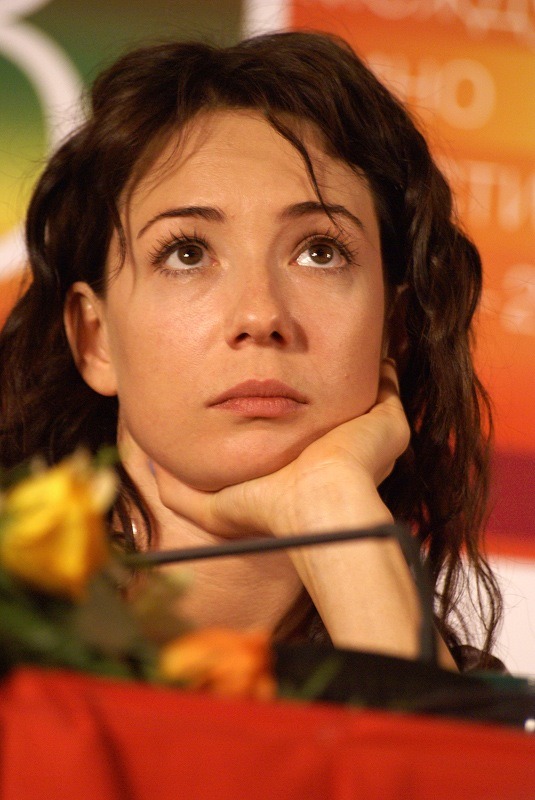#chulpan
Text
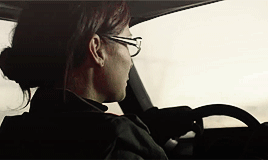

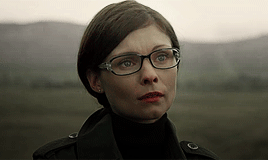

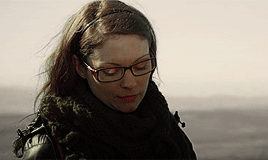
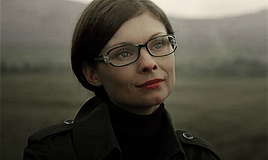
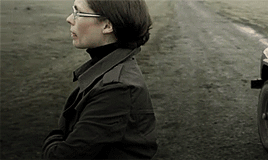
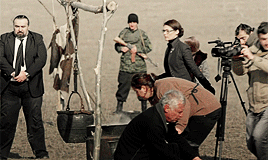
Chulpan... Everyone falls for her in the end.
90 notes
·
View notes
Text
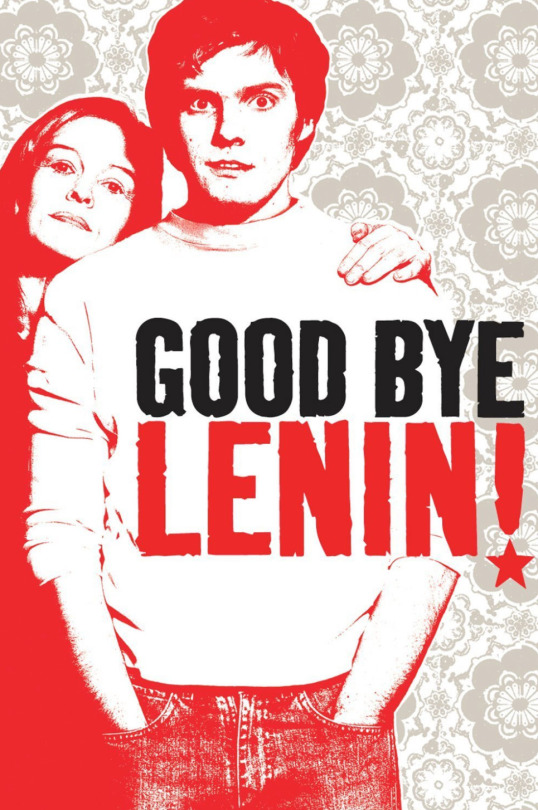
#movies#polls#good bye lenin!#good bye lenin#2000s movies#wolfgang becker#daniel brühl#katrin sass#chulpan khamatova#requested#have you seen this movie poll
145 notes
·
View notes
Text



🐱 Exotic Shorthair
📸 Liliya Zakirova [Chulpan]
🎨 Black Silver Spotted Tabby
11 notes
·
View notes
Text


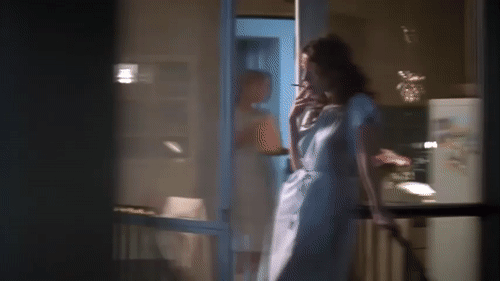




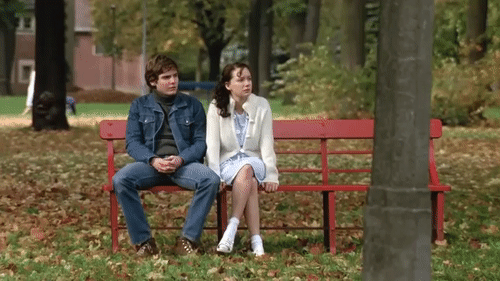

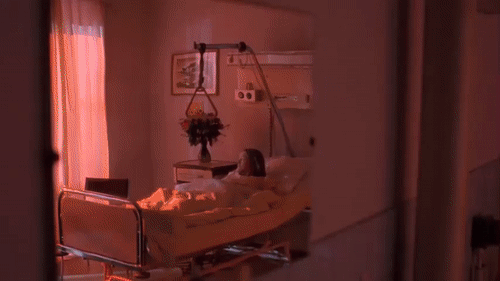
Good Bye Lenin! (2003)
#goodbye lenin#wolfgang becker#daniel bruhl#katrin sass#chulpan khamatova#film#cinematography#drama#comedy#romance#nature#wedding#fireworks#cieuxgris
21 notes
·
View notes
Photo

Ralph Fiennes verfilmt schön karg und kunstvoll das Leben des jungen Rudolf Nureyev bis zu seiner abrupten, dramatischen Flucht in den Westen, obwohl er nach eigenem Bekunden keine Ahnung vom Ballett hat und das Leben des älteren Nureyev womöglich noch interessanter geworden wäre. Vielleicht gibt es ja noch eine Fortsetzung mit Valentino und Muppetshow. Selbstredend gelingt es niemandem, so überheblich wie der echte Nureyev rüberzukommen (vielleicht war es ja auch in seiner Jugend noch nicht so schlimm), aber Oleg Ivenko schlägt sich sehr tapfer. Und hat auch Ahnung vom Ballett.
#The White Crow#Oleg Ivenko#Adèle Exarchopoulos#Chulpan Khamatova#Raphaël Personnaz#Ravshana Kurkova#Sergei Polunin#Film gesehen#Ralph Fiennes#Rudolf Nureyev#sexy Jungs
3 notes
·
View notes
Photo
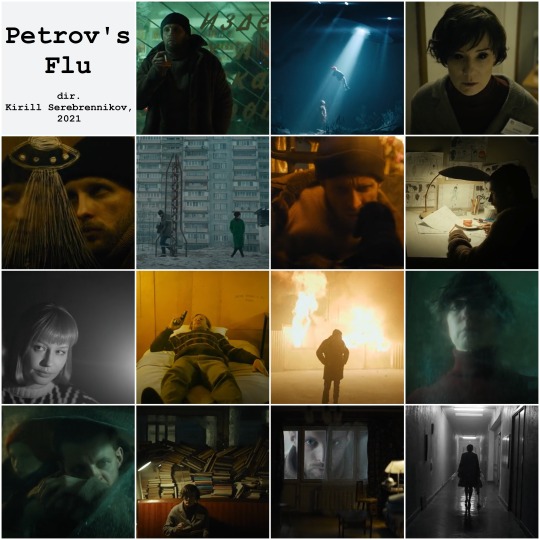
Petrov’s Flu
directed by Kirill Serebrennikov, 2021
#Petrov's Flu#Kirill Serebrennikov#movie mosaics#Semyon Serzin#Vladislav Semiletkov#Chulpan Khamatova#Yulia Peresild#Ivan Dorn
2 notes
·
View notes
Text
North Korea Sounds Nice
Chulpan Khamatova, Sobchak Live, 6 June 2012
[Ksenia] Sobchak: You want your children to live in a stable country without revolution?
[Chulpan] Khamatova: Without revolution. It could be some kind of changes in mindset. Without revolutions. I don’t want revolution. I’m categorical on this point, because the heads of completely innocent people fly in revolution and all these wars. I don’t think…

View On WordPress
#charities in Russia#Chulpan Khamatova#Gift of Life Foundation#Ksenia Sobchak#Mikhail Zygar#North Korea#Yuri Shevchuk
0 notes
Photo
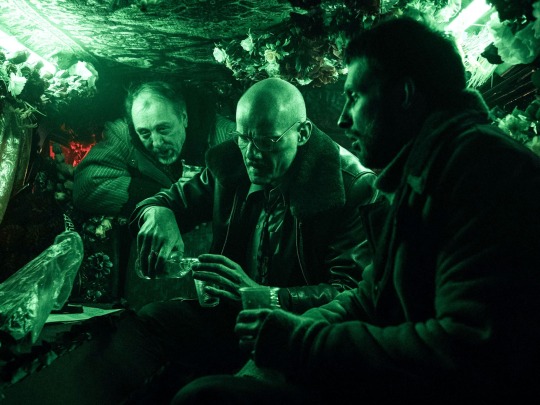
Petrov's Flu https://bit.ly/3fTNkLO Kirill Serebrennikov, the director of Petrov’s Flu (Petrov v grippe), wasn’t at Cannes in 2021 to see his film screened, as he hadn’t been at Cannes to see his previous film, LETO, screened in 2018. He was under house arrest back home in Russia, having been accused of embezzling funds from the Seventh Studio, one of several cultural institutions he was connected to. The charges were widely seen as trumped up, part of Vladimir Putin’s ongoing fight against liberal elements in Russia – Serebrennikov is a vocal supporter of LGBT causes. Given all that background, you might expect Petrov’s Flu, a fictional work but one set in the post-Soviet era, when society had … Read more
0 notes
Text
Film #488: 'Good Bye, Lenin!', dir. Wolfgang Becker, 2003.
When the list is so full of 'important' films, without any consideration to the actual pleasure of sitting with a text for two hours, it's a relief to be able to encounter a definitive crowd-pleaser. Good Bye, Lenin! is a film that I have recommended to many people, including my parents. It's the kind of film that was produced in Europe quite often in the late 1990s and early 2000s, and that I fondly remember looking through in the 'Festival' section of my local video store before those places ceased to exist - a mix of comedy and poignancy designed to get the audience thinking about things, but not on a particularly deep level. It's usually combined with a frenetic or notable style of cinematography or editing that sets it apart from the Hollywood fare of the time. So, the film makes for an enjoyable watch, and it's a well-produced and entertaining movie. And yet, halfway through my most recent watch, I found myself thinking... why is it on the list?
The list is not particularly revealing on the subject, either - most of its write-up on the film touches on the same issues I touch on above: its poignancy and humour. Its final paragraph does hint at one of the themes of the film, though: how a character's outward actions can make sense on a logical and narrative level, while possibly representing that character's deeper, unspoken concerns as well.
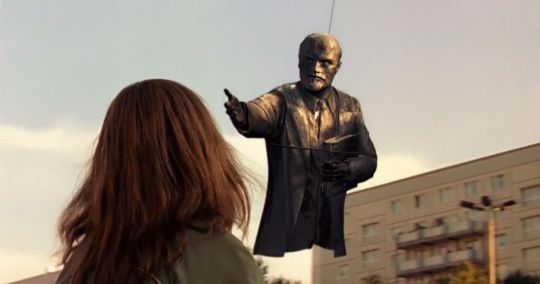
The life of the teenaged Alex (Daniel Brühl) is as stable as one can hope for in the dying years of the German separation. He has lived with his mother Christiane (Katrin Sass) and sister Ariane (Maria Simon) in East Berlin ever since his father left, apparently to live with another woman (and class traitor) in the West. His mother descended into a catatonic state until, partly as a result of Alex's love, she recovered and threw herself into socialist enthusiasm and civic work. By 1989, however, Alex has become disillusioned with East Germany's blind patriotism. His mother sees him arrested at an anti-government protest and suffers a heart attack, following which she falls into a long coma. The long-awaited political upheaval comes at a thoroughly inconvenient time - by the time Christiane awakens, the Berlin Wall has fallen and her beloved East Germany has ceased to exist. Warned by doctors that any shock might cause a fatal heart attack, Alex ropes his sister and friends into an elaborate deception so that Christiane never learns what has happened.
This level of deception is almost impossible to maintain, as before long even the view outside the bedroom window carries unmistakable signs of the march of capitalism. Alex has to spend his days sourcing jars from long-discontinued products, persuading his mother to give them access to her life savings so that they can secretly convert them into West German marks, and collaborating with his colleague to forge news programs explaining away the strange occurrences. Meanwhile, he has also fallen in love with Lara (Chulpan Khamatova), his mother's nurse who he briefly met at the protest. Lara is an understanding and empathetic partner, despite her reservations about the level of deception Alex is involved in. On a brief visit to the family's holiday home, Christiane reveals that her husband didn't actually abandon his family. Rather, he had made preparations for his family to join them in the west, and it was Christiane who refused to leave, worrying for the safety of her children. It seems the stress of this revelation causes her to relapse, and she is taken to the hospital that night. Alex manages to trace his father's whereabouts, and convinces him to visit Christiane in the hospital. Aware that his mother will probably not recover, he organises one final 'broadcast', in which East Germany's new president announces that the borders will be opened to the west. He shows his mother this broadcast, unaware that Lara has already revealed the truth to her: touched by the level of love and care her son has shown, she pretends to believe the news report. Christiane dies a few days after the German reunification, with Alex secure in the knowledge that his mother believed in a change in German society more aligned with her politics than the messy reality.
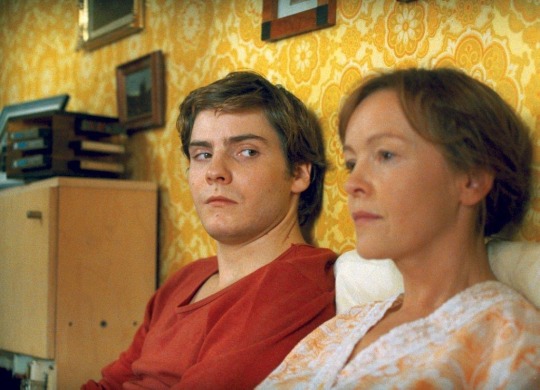
While Good Bye, Lenin! is a touching and entertaining film, there's not too much about it that feels special, which is why I was a little mystified to see it here. The commitment the film has to its central story means that it moves at a brisk pace, but this commitment does mean that it lets some of its plot threads dangle, especially towards the end of the film. Ariane, who has left her studies to get a job at Burger King, sees her long-lost father in the drive-through one night. Distraught by his apparent lack of communication over the years, she refuses to speak to him when she sees him at the hospital. The film doesn't show any kind of reconciliation between the two, nor does it get bogged down in any kind of complexity when it comes to Alex and Lara's relationship. Lara is angry at Alex for his deception, but then she is supportive. Aside from telling Christiane what has really happened while she has been isolated from the outside world, there is no process of acceptance or negotiation. The film would like the audience to always be aware of the absurd practical complexity of this ruse, but to dismiss the emotional complexity as unimportant. Too much focus on the ethical implications would kill the lightness of the mood. As an example, Christiane's amnesia means that she has initially forgotten where she hid her life savings. The pressure Alex and Ariane put on her to remember is understandable, as there is a deadline for the exchange of the old currency into the new, but without Christiane knowing the true context, the scene carries an edge of harassment. At last, she remembers that she hid the money in a piece of furniture that was put out for trash collection. Conveniently (although perhaps six months might have passed?) the discarded furniture is still there, so Alex can retrieve the money, but it is slightly after the exchange deadline. The next scene shows a drunk Alex hurling the useless banknotes into the wind. While the outward tone of the scene is zany, the film is constantly prodding at a twin pair of pains: the pain of duping Christiane, and the pain of losing hundreds of thousands of marks. What's more, these concerns never really reappear in the film - they've served their comic purpose and can be discarded.
I don't want to imply that this is a failure of the film on any level, but it's an indication that Becker is trying to strike a balance that doesn't feel quite right. There are no shortage of sequences which are hilarious and cringeworthy in equal measure, but in a good way: a massive billboard for Coca-Cola interrupts a birthday party, and Alex races to invent a news bulletin that reveals that Coca-Cola has been an East German invention all along. For every two comfortably funny scenes, though, there is one that slices a bit too close to the bone, and lays bare Lara's perspective, that the deception has pushed beyond a defensible level. The end result, with everyone gathered amicably at the scattering of Christiane's ashes, feels like a neat closure that isn't fully earned - one that waves away too many inconvenient details.
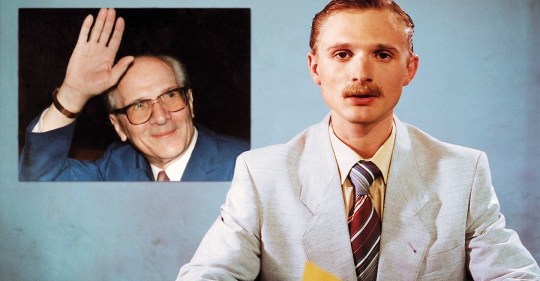
Some Marxist commentary has been put forward on the film suggesting that Alex is a clear representative of 'Ostalgie': a nostalgia for East Berlin that arose in some Germans following disillusionment with the West and its capitalist ruling structures. While it is true that Alex has a fondness for some of the cultural touchstones of the pre-reunification lifestyle, with apologies to the writers at the Green Left Weekly, I think this is an over-simplification of the emotional message of the film, and it also overlooks the obvious fact that Alex, Lara and Ariane are all pro-West. There are certainly some indications of capitalist malaise in the film (and some humour is wrung from this, such as the sight of various demographics of people all crammed into a shop to mindlessly watch soft-core pornography). Overall, though, Alex's intentions here are not to recapture the experiences of East Berlin for his own sake, but rather because this period of political history has become inextricably linked with his mother. The death of East Berlin is synonymous for Alex with the death of his mother, and he seeks to make the latter less painful for himself by easing his mother out of the former. As he says in voiceover, he wants to give East Berlin the send-off it deserved, and that logic easily extends to Christiane. The final faux-broadcast could have been an unvarnished advocacy of the new Germany - Alex even summons one of his childhood heroes, a German cosmonaut who now drives a taxi, and temporarily fashions him into a new German leader - but the content of the final broadcast is a plea in favour of the open-hearted community spirit that belongs to Christiane. That's what makes the scene so affecting: it's a pageant put on for one woman, who experiences the last few moments with the understanding that her son is who he is because of her. In the final scene where they spread Christiane's ashes by attaching them to a model rocket, Alex wryly observes that neither East or West Berlin would have legally allowed this to happen, a sign that his mother's wishes supersede any political structure.
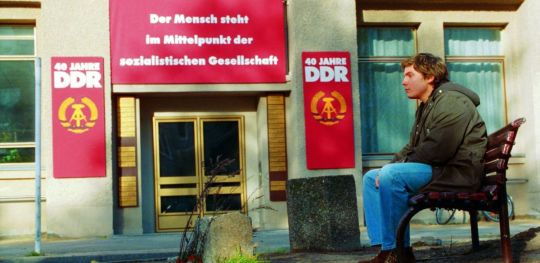
Good Bye, Lenin! is an unusual film on its surface, but it's not one that is so unusual in any aspect that it obviously belongs here. On a granular level, the list is always going to be arbitrary, but the familiarity of this film and its techniques (editing from Run Lola Run; a soundtrack by Yann Tiersen that reuses a piece from Amelie two years earlier) mean that it's not indispensable by any means. I think that's okay - they can't all be groundbreaking experiments in cinema, and sometimes it's enough for something just to be pleasing. And if something like this is going to be a general audience's first encounter with popular German cinema, things could be far, far worse.
5 notes
·
View notes
Text
WORLD CINEMA’S TOP 236 ACTRESSES OF ALL TIME! (@INDIES)
http://www.imdb.com/list/ls569475215/
Position. Name.
1 Barbara Stanwyck
2 Olivia de Havilland
3 Meena Kumari
4 Geraldine Page
5 Audrey Hepburn
6 Suchitra Sen
7 Vivien Leigh
8 Ginger Rogers
9 Elizabeth Taylor
10 Katharine Hepburn
11 Kate Winslet
12 Julia Roberts
13 Norma Shearer
14 Nathalie Lissenko
15 Hasmik Agopyan
16 Catherine Deneuve
17 Chulpan Khamatova
18 Nataliya Vdovina
19 Elena Solovey
20 Brigitte Bardot
21 Aleksandra Khokhlova
22 Jeanne Moreau
23 Anna Karina
24 Isabelle Adjani
25 Romy Schneider
26 Léa Seydoux
27 Mélanie Laurent
28 Audrey Tautou
29 Ekaterina Chtchelkanova
30 Vanessa Paradis
31 Simone Signoret
32 Emmanuelle Béart
33 Isabelle Huppert
34 Sandrine Bonnaire
35 Carole Bouquet
36 Anne Parillaud
37 Fanny Ardant
38 Sophie Marceau
39 Nathalie Baye
40 Anouk Aimée
41 Alexa Davalos
42 Josiane Balasko
43 Clémence Poésy
44 Natalija Janichkina
45 Laetitia Casta
46 Eva Green
47 Elodie Yung
48 Kristin Scott Thomas
49 Anna Mouglalis
50 Astrid Bergès-Frisbey
51 Charlotte Gainsbourg
52 Capucine
53 Roxane Mesquida
54 Jane Birkin
55 Bérénice Bejo
56 Olga Kurylenko
57 Leslie Caron
58 Josephine Baker
59 Pom Klementieff
60 Noémie Merlant
61 Adèle Haenel
62 Adèle Exarchopoulos
63 Emma Mackey
64 Yael Grobglas
65 Emmanuelle Seigner
66 Juliette Binoche
67 Ellen Burstyn
68 Madhavi Mukherjee
69 Isabelle Weingarten
70 Sarah Adler
71 Christa Théret
72 Karin Viard
73 Déborah François
74 Marie Gillain
75 Juliet Berto
76 Mélanie Doutey
77 Monique Mélinand
78 Stéphane Audran
79 Léa Drucker
80 Dominique Labourier
81 Angélique Litzenburger
82 Françoise Lebrun
83 Valérie Donzelli
84 Bernadette Lafont
85 Sylvie Testud
86 Cécile de France
87 Katia Leclerc O'Wallis
88 Zouzou
89 Françoise Fabian
90 Maria Schneider
91 Agnès Jaoui
92 Valeria Bruni Tedeschi
93 Aurora Cornu
94 Stacy Martin
95 Lola Créton
96 Laurence de Monaghan
97 Dominique Blanc
98 Béatrice Romand
99 Mélanie Thierry
100 Caroline Cellier
101 Michèle Moretti
102 Geneviève Page
103 Elina Labourdette
104 Anne Wiazemsky
105 Marie Dubois
106 Claudine Auger
107 Annie Girardot
108 Juliette Mayniel
109 Brigitte Fossey
110 Martine Carol
111 Dolly Scal
112 Patricia Gozzi
113 Marilou Berry
114 Maria Mauban
115 Janine Darcey
116 Suzanne Flon
117 Colette Marchand
118 Françoise Arnoul
119 Ludivine Sagnier
120 Béatrice Dalle
121 Claude Nollier
122 Josette Day
123 Nicole Stéphane
124 Catherine Salée
125 Dominique Sanda
126 Marina Hands
127 Cécile Aubry
128 Nicole Ladmiral
129 Bulle Ogier
130 Véra Clouzot
131 Simone Renant
132 Sylvia Bataille
133 Suzy Delair
134 Jane Marken
135 Nane Germon
136 Lucienne Bogaert
137 Renée Carl
138 Catherine Frot
139 MarÃa Casares
140 Arletty
141 Odette Joyeux
142 Marguerite Moreno
143 Madeleine Robinson
144 Héléna Manson
145 Paulette Dubost
146 Micheline Francey
147 Ginette Leclerc
148 Mady Berry
149 Edwige Feuillère
150 Jacqueline Laurent
151 Mila Parély
152 Florelle
153 Claudette Colbert
154 Danielle Darrieux
155 Rolla France
156 Annabella
157 Anne Chevalier
158 Lya Lys
159 Simone Mareuil
160 Maria Falconetti
161 Yvette Andréyor
162 Musidora
163 Nora Arnezeder
164 Virginie Ledoyen
165 Michèle Morgan
166 Marine Vacth
167 Louise Bourgoin
168 Caridad de Laberdesque
169 Pauline Carton
170 Sévérine Lerczinska
171 Odette Talazac
172 Léora Barbara
173 Simone Simon
174 Marion Cotillard
175 Mireille Darc
176 Edith Scob
177 Chantal Goya
178 Emmanuelle Riva
179 Chiara Mastroianni
180 Claire Maurier
181 Marika Green
182 Delphine Seyrig
183 Mylène Demongeot
184 Marie-France Pisier
185 Françoise Dorléac
186 Marina Vlady
187 Stella Dassas
188 Marpessa Dawn
189 Elsa Zylberstein
190 Bleuette Bernon
191 Sara Forestier
192 Pascale Ogier
193 Amanda Langlet
194 Julie Delpy
195 Linh-Dan Pham
196 Nelly Borgeaud
197 Nicole Garcia
198 Irène Jacob
199 Myriem Roussel
200 Arielle Dombasle
201 Marie Rivière
202 Solveig Dommartin
203 Émilie Dequenne
204 Ariane Labed
205 Zabou Breitman
206 Romane Bohringer
207 Sabine Azéma
208 Hafsia Herzi
209 Andréa Ferréol
210 Jeanne Balibar
211 Isabelle Renauld
212 Mireille Perrier
213 Juliana Samarine
214 Catherine Mouchet
215 Aurora Marion
216 Anaïs Demoustier
217 Judith Chemla
218 Marie Laforêt
219 Michele Valley
220 Hélène Alexandridis
221 Anne Consigny
222 Macha Méril
223 Anne Brochet
224 Miou-Miou
225 Anne Teyssèdre
226 Joséphine Sanz
227 Gabrielle Sanz
228 Fantine Harduin
229 Charlotte Véry
230 Élodie Bouchez
231 Natacha Régnier
232 Pili Groyne
233 Yolande Moreau
234 Emmanuelle Devos
235 Nina Meurisse
236 Florence Darel
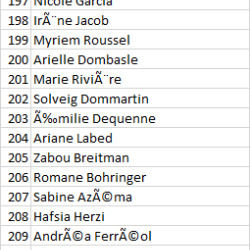
4 notes
·
View notes
Text
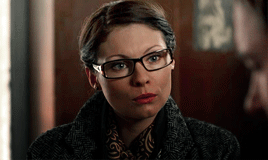
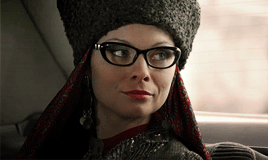


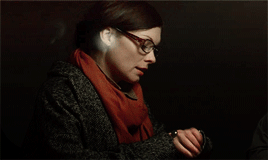


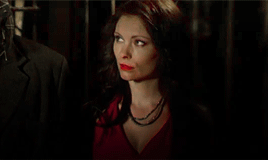
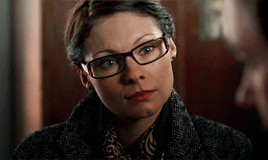
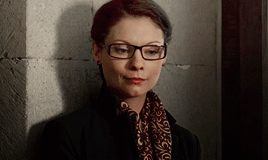
Myanna Buring as Chulpan (Lost in Karastan, 2014)
#HERE WE GO#some nice matchy gifs from the first half of the movie#will have to sort out a different coloring for some of the other darker scenes because the light is weird af#and i couldn't get them to look right here#myanna buring#lost in karastan#arwen makes gifs#chulpan
57 notes
·
View notes
Text

#movies#polls#the white crow#white crow#the white crow movie#the white crow 2018#2010s movies#ralph fiennes#oleg ivenko#adèle exarchopoulos#chulpan khamatova#requested#have you seen this movie poll
49 notes
·
View notes
Text
Hi everyone! My name is Chulpan! I’m 25. I’m trying to learn English and Chinese by myself, at the same time doing my PhD in reservoir engineering and work in science laboratory.
I hope this blog will help me to achieve my goals, maybe find new friends for practicing my language skills!
Let’s get it started!

2 notes
·
View notes
Text
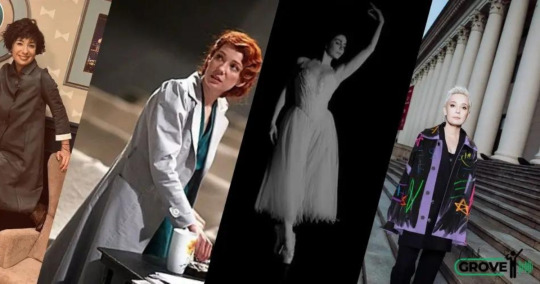
Chulpan Khamatova - Biography, Relationship, Figure, Life, Age, Height, Wiki, Career, Images, Net Worth, Family and More
Chulpan Khamatova is a kind lady from Russia. She was born on October 1, 1975. When she was little, she loved acting and pretending to be different characters. As she grew up, she decided to become an actress for real.
Read More on:
https://celebgrove.com/chulpan-khamatova/
0 notes
Text
THE BLACK BOOKS OF ...
Following the demise of the USSR and Eastern European socialist bloc, anti communist crusade continues as the CIA and its European hidden networks have bought academics and journalists highly paid with two main objectives,(1) hammer in the popular psyche the idea that communism has failed,that communism=Stalin=Gulag (2) the pervasive propaganda of TINA(there is no alternative) popularized both by Miss Thatcher, that is there is no alternative to capitalist system and the so called liberal democracy and Francis Fukuyama’s “the end of history” To achieve the first objective, the CIA and its hidden European networks and organizations funded academics, filmmakers, intellectuals and journalists used as proxies to serve the economic and geopolitics of the USA in Europe. Two works to illustrate such anti communist propaganda, it is worth noticing (1) the movie “Good bye Lenin” directed by Wolfgang Becker, Scripted by : Bernd Lichtenberg, Wolfgang Becker, with actors Daniel Brühl, Katrin Sass, Alexander Beyer, Chulpan Khamatova, Florian Luka, (2) the” black book of communism, crimes, terror, repression” a collective work published in 1997 under the direction of the infamous anti communist historian Stephane Courtois and French and foreign historians at the occasion of the 80th anniversary of the Bolshevik revolution. Strangely, these fake historians who are but anti communist propagandists have turned blind eye to the crimes, terrors, repression and endless bloody wars of capitalism, and its two corollary colonialism and imperialism. Fortunately, in reply to fake anti communist historian, authors of “black book of communism”, a voluminous and collective book entitled “the black book of colonialism” has been published in 2001 under the guidance of a real and genuine French historian, Marc Ferro, author of several book on the Russian revolution of 1917. In the very seminal book, one can discover for instance that the 20th century was started with the first genocide committed in today Namibia by the German colonizers of the II Reich who were built up the first camps of concentration serving as pattern to nazi camps to intern and to repress between 1904 and the 1908 the revolt of the Herrero, and nama indigenous tribes as nearly 80% of Herero people and 50% of nama people have been massacred and exterminated that is nearly 65 000 Herero and 10 000 Nama.
0 notes
